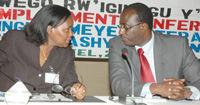The Minister of Public Service, Skills Development and Labour Prof. Manasseh Nshuti has clarified that all foreigners will not require work permits to work in


The Minister of Public Service, Skills Development and Labour Prof. Manasseh Nshuti has clarified that all foreigners will not require work permits to work in Rwanda anymore.
"Beginning this year, foreigners will no longer need work permits in order to operate in Rwanda," he said on Thursday, retracting his earlier statement that only foreigners with at least a Masters degree would be exonerated.
And in a statement published in this newspaper yesterday, Nshuti said "that was not true" in reference to his last week’s comments.
Speaking at a press briefing on Thursday, the minister said that the government of Rwanda is opening up its job market in order to attract foreign skills in line with the country’s development agenda.
"We are searching for experienced partners with various qualifications to spearhead development," Nshuti said.
He assured Rwandans that they should not get worried about the likely competition for jobs saying they remain the priority since they are nationals.
He urged all Rwandans to support and cooperate with foreign workers and stop looking at the move as exposure to vulnerability but rather as an opportunity to improve on their own skills and services.
He added: "We must double our efforts because no country has developed without nationalism."
The State Minister in charge of Labour and Skills Development Angelina Muganza said that the development will help improve working conditions and the skills of the workforce.
She said it would be easier to let workers go for further studies
Muganza further warned against child labour and urged workers to fight HIV/Aids.
In a related development, Rwanda needs to create at least 140,000 new jobs annually, according to Prof. Nshuti.
"The working population grows rapidly at an average annual rate of three percent and that there was need for all potential employers to create new jobs in order to keep the problem of unemployment at less than 10 percent of the population," Nshuti said.
The minister was yesterday addressing participants in the national employment dialogue yesterday at Kigali Serena Hotel held under the theme "Employment is the Major Pillar to Development; Get Committed and Eradicate Poverty".
"Tackling unemployment by creating more jobs is everyone’s duty," Nshuti said.
He said that in Rwanda, the active population is estimated at 4,492,000 of whom 44.77 per cent are men and 55.23 percent women. Among these, 2,334,000 are aged between 15-29 years.
Rwanda has a population of roughly 10 million.
He said a big number of the working population lack required capacity to carry out their responsibilities efficiently.
A survey conducted by the ministry on the employment status in the country, over 37.50 percent of the working population have never been to school, 55.56 percent obtained primary school education, while only 2.03 percent have post primary education level.
About 4.40 percent obtained secondary school education while around 0.51 percent have university education, according to the survey.
Those who are self-employed, the report indicates, stand at 76.81 percent while family helpers constitute 15.22 percent, together representing a total of almost 92.03 percent of the working population.
Agricultural and livestock sectors are estimated to account for 87.63 per cent of the working population, and are largely occupied by people with no education.
He explained that 83.1 percent of the population live in rural areas, which he said need to be equally developed in order not to be left behind.
Ends


